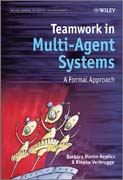
Teamwork in multi-agent systems: a formal approach
Dunin-Keplicz, Barbara Maria
Verbrugge, Rineke
This book focuses upon the next generation of software agents, which can be viewed as planners from the artificial intelligence perspective, capable to plan from first principles, using contemporary planning techniques. In five yearstime the authors believe that the field of multi-agent systems will be ready to develop working applications involving heterogeneous software agents, robots and human beings, embedded in an uncertain dynamic environment. The authors provide vital underpinnings for teamwork (a team of agents working collectively in a planned and coherent way), and present the ways in which these groups offer a common collective attitude over and above those of the individual. Thisorganization of teamwork leads ultimately to team action: goal-inspired activity. The chapters offer the following areas for discussion: Information Attitudes in Teamwork (perception, reasoning, awareness and expression), Collective Intentions (logical language for informational and motivational attitudes, group reasoning/ collective intentions), Reconfiguration in Dynamic Environments (four stages of Distributed Computing Primitive (DCPS), potential recognition,team formation, reconfiguration), Dialogue in Teamwork (theory in Conversational Programming System (CPS), negotiation, inquiry, deliberation, information seeking etc), Complexity of TeamLog (computational, semantics based on Kripe models, background, and many more).
- ISBN: 978-0-470-69988-1
- Editorial: John Wiley & Sons
- Encuadernacion: Cartoné
- Páginas: 248
- Fecha Publicación: 02/07/2010
- Nº Volúmenes: 1
- Idioma: Inglés
